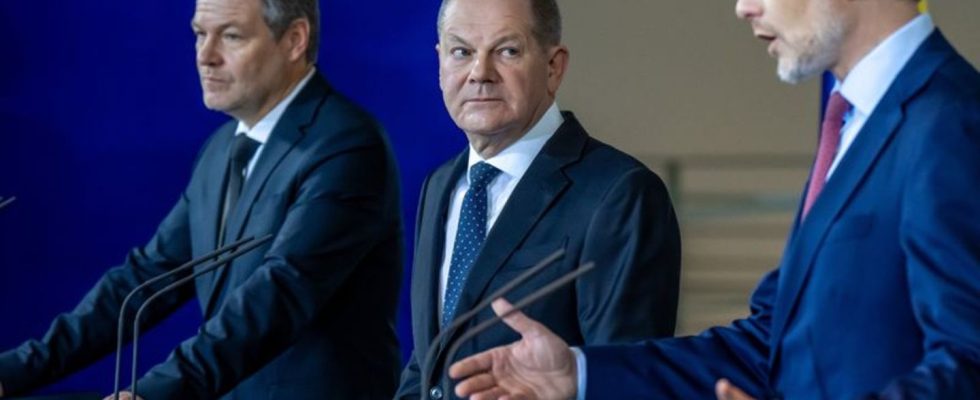The coalition leaders have argued for weeks about the new edition of the 2024 budget. Now it’s done and the criticism is huge. So the result still has to be sold well.
After the agreement in the weeks-long budget dispute, the leaders of the traffic light coalition emphasized the social acceptability of their compromise. With a view to the effects of the agreed higher CO2 price, Chancellor Olaf Scholz (SPD) said that there were “very small additional burdens” on the price of gasoline.
He, Finance Minister Christian Lindner (FDP) and Vice Chancellor Robert Habeck (Greens) emphasized that the planned tax relief would remain in the 2024 federal budget. However, economic experts and associations criticized the fact that the promised climate money as social compensation for increasing climate protection burdens is still not coming.
Relief and very low stress
Scholz emphasized that the agreed wage and income tax relief amounting to 15 billion euros remained in place. “It stays with them. And that applies to small and medium incomes,” he said on Wednesday evening in the ARD program “Show Color”.
Lindner emphasized in the “ZDF special” that “there will be clearly noticeable relief for the broad middle of the population from January 1st next year”. Economics Minister Habeck said on ZDF’s “Heute Journal”: “Not only is it all a burden, but we are also defending the relief.” He pointed out that the state continues to charge electricity customers the costs of the levy to promote green electricity (EEG levy).
In an interview with the German Press Agency, FDP parliamentary group leader Christian Dürr also spoke of a “relief budget” for the working population and the economy.
Increase in CO2 prices: increase in energy costs
The very small additional burden on the price of gasoline that Scholz is talking about results from the fact that the price for the emission of climate-damaging carbon dioxide (CO2) is being raised more than initially planned: from 30 euros per ton of CO2 to now 45 instead of just 40 euros. This means that fuel, natural gas and heating oil, among other things, become more expensive, by how much has already been calculated.
The ADAC puts the additional burden on petrol and diesel at 1.4 to 1.6 cents per liter (including the already decided increase from 2023 to 2024: around 4.3 and 4.7 cents respectively). When purchasing gas, according to calculations by the comparison portal Check24, this now means an additional burden of 20 euros for a household with 20,000 kilowatt hours of annual consumption (overall compared to 2023: 60 euros more).
In addition, the federal subsidy for electricity network costs has been canceled, so that the network fees paid by consumers will rise – by 60 euros for an average household with 3,500 kilowatt hours of annual consumption, according to the transmission network operator 50Hertz.
Criticism from outside
The economist Veronika Grimm is therefore appealing to the traffic light to introduce the payment of climate money to citizens, which was already agreed in the coalition agreement, to compensate. “That would be a very important measure to create acceptance for climate protection,” she told broadcaster Welt TV. People with little income would particularly benefit from this: they would generally have a small CO2 footprint, but would get as much back per capita as everyone else.
The Vice President of the Leibniz Institute for Economic Research Halle (IWH), Oliver Holtemöller, sees it similarly. “The rise in the CO2 price is something that economists have recommended for a long time in order to achieve climate protection goals efficiently,” he told MDR. The fact that social compensation is missing is “a deficiency”.
The social association VdK is also calling for this to change. “An increase in the CO2 price is anti-social,” said VdK boss Verena Bentele to the Germany editorial network. “That’s why climate money has to come so that people with small pockets aren’t put under an excessive burden.”
And CDU politician Gitta Connemann also criticizes the traffic light coalition’s budget plans. “It took this government 28 days to reach a minimal compromise in the end,” she said on ZDF. “However, at the expense of citizens and companies.” The traffic light has now presented a compromise and is thus saving itself over the winter. “This budget is still not clean,” criticized Connemann.
Karlsruhe verdict: New budget necessary
After weeks of dispute, the coalition leaders reached an agreement early on Wednesday morning. The new budget planning became necessary because, following a constitutional court ruling on the 2021 budget, the old planning with special funds was no longer considered constitutional. This means that the coalition is missing around 30 billion euros for 2024.
Key points of the solution
– Debt brake: It should not initially be suspended in 2024, but an exception should be examined for the consequences of the flood disaster in the Ahr Valley. In the event of a change in the situation in Ukraine, the traffic light reserves the right to suspend it later and to take out additional loans.
– Billions in subsidies for industrial projects in East Germany such as Intel’s chip factory near Magdeburg: The traffic light wants to stick to this – as well as the expansion of a hydrogen economy.
– CO2 price for refueling and heating with fossil fuels: This should not rise to 40 euros per ton on January 1, 2024 as previously planned – but to 45 euros and then to 55 euros in 2025.
– Fees for the electricity networks: The 5.5 billion euro federal subsidy will be canceled. So electricity becomes more expensive.
– E-car funding: It should end earlier – when is unclear.
– Energy tax: Tax concessions for agricultural diesel should be abolished.

